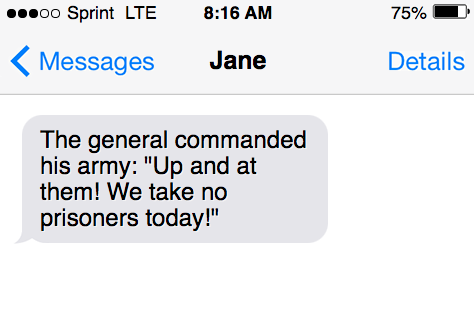Up at at them. Or up and Adam? What is the correct way to refer to this common idiom that’s used to pursue the day? The origins of this commonly used American English idiom is unique.
Learn more in this short idiom guide…
What does “up and at them” or “up and adam” mean?
The colloquial term “up and at them” refers to the process of rising from sleep and beginning a day. It has an energetic connotation and signifies the action of waking up to accomplish many goals on a bustling day. The term denotes that you will fight back and give the day everything you’ve got to overcome the obstacles on the way.
It is used in contexts that require a boost to power through a busy day full of events. It is also used in motivational situations like when great tasks are going to be achieved or when a leader inspires the masses in a stirring speech, for instance. The colloquially recognized iteration of the phrase is “up and at ’em”.
You might have come across similar phrases like “up and Adam” and “up and atom”. Many think they are related to “up and at them” or “up and at ’em”, but this is incorrect. The original expression is often misheard and confused with these warped phrases, leading to misconceptions that they originate from the Bible or science.
But they are wrong usages and bear no actual meaning. Only “up and at them” or “up and at ’em” are grammatically accurate and popular usages recognized by the English language.
Origins of the idiom “up and at them”
Military officers popularized the term during the World Wars and used it to mobilize troops and motivate comrades. Its enthusiastic connotation was effective in instilling a thirst for victory and warfare. However, its origins have been documented in the literature of the early 19th century. The first coinage can be found in The Battle of Waterloo, a series of real accounts compiled by an observer.
In this compilation, the phrase is used as a battle cry to give soldiers a wave of motivation and energy to spare no effort for the sake of winning. It has rhetoric roots familiarized by politicians and great leaders through the ages who used the expression to empower citizens towards positive change.

Examples of use in sentences
Typically, the phrase “up and at them” is used in situations where people embrace the morning with a lively attitude. But depending on the context, it can be employed in different ways.
It can persuade people towards action, inspire a group of same-minded individuals towards a common goal, or when leaders give commands to their followers.
- We have a long journey ahead of us. Up and at ’em!
- The general commanded his army: “Up and at them! We take no prisoners today!”
- The child was sleeping without a care in the world. His mother yelled, “Up and at ’em, sunshine! You can’t be late on the first day of school!”
- If you have tried nine times, even the mightiest tree will fall on its tenth blow. Don’t lose heart – up and at them!
- The boss told the employees, “I know we’ve been having a rough year but every day is another chance for us to do better. Up and at ’em!”
Synonyms for “up and at them”
Use these words instead of “up and at ’em”:
- awaken
- greet the day
- arise
- get going
- get out of bed
- activate
- propel
- liven up
- energetic
- brisk
- exuberant
- vivacious
- jump-start
- kick-start
- pep up
- set off
- take off
- blast off
- wide-awake
- show signs of life
Antonyms for “up and at them”
These are some words that mean the opposite of “up and at ’em“:
- retire
- go to bed
- call it a day
- hit the hay
- turn in
- snooze
- slumber
- doze off
- drop off
- slump
- shut-eye
- dormant
- inactive
- sluggish
- lethargic
- drowsy
- inert
- resting
- quiescent
- slothful
How do you say “up and at them?”
Generally, the shortened version “up and at ’em!” is used everywhere as it is the most popular version even though it has an informal connotation.
“Up and at them” is also employed in speaking and writing but is adopted in more formal contexts.
- I told my teammates, “If there is no way to find the missing link in the blueprint tonight, let’s call it a day. Tomorrow is the day – we will up and at ’em!
- Studies have shown that those who are up and at them by 6 am every day lead a healthy life. On the other hand, those who stay up late and wake up late face a number of health problems.
- The marathon began in the wee hours of the morning but they did not have many participants. Turns out not many were willing to be up and at them by 4 am.
- The President appealed to the youth of the world in a rousing speech. “What excites you? What makes your heart beat? What gets you up and at ’em every day?
- My therapist told me that my loss of interest in daily activities and inability to be up and at ’em every morning could be a sign of mild depression.
- My teacher told me I should follow my dreams no matter what. But what if I couldn’t even find the will in life to be up and at ’em?
Inside this article
Fact checked:
Content is rigorously reviewed by a team of qualified and experienced fact checkers. Fact checkers review articles for factual accuracy, relevance, and timeliness. Learn more.
Core lessons
Glossary
- Abstract Noun
- Accusative Case
- Anecdote
- Antonym
- Active Sentence
- Adverb
- Adjective
- Allegory
- Alliteration
- Adjective Clause
- Adjective Phrase
- Ampersand
- Anastrophe
- Adverbial Clause
- Appositive Phrase
- Clause
- Compound Adjective
- Complex Sentence
- Compound Words
- Compound Predicate
- Common Noun
- Comparative Adjective
- Comparative and Superlative
- Compound Noun
- Compound Subject
- Compound Sentence
- Copular Verb
- Collective Noun
- Colloquialism
- Conciseness
- Consonance
- Conditional
- Concrete Noun
- Conjunction
- Conjugation
- Conditional Sentence
- Comma Splice
- Correlative Conjunction
- Coordinating Conjunction
- Coordinate Adjective
- Cumulative Adjective
- Dative Case
- Determiner
- Declarative Sentence
- Declarative Statement
- Direct Object Pronoun
- Direct Object
- Diction
- Diphthong
- Dangling Modifier
- Demonstrative Pronoun
- Demonstrative Adjective
- Direct Characterization
- Definite Article
- Doublespeak
- False Dilemma Fallacy
- Future Perfect Progressive
- Future Simple
- Future Perfect Continuous
- Future Perfect
- First Conditional
- Irregular Adjective
- Irregular Verb
- Imperative Sentence
- Indefinite Article
- Intransitive Verb
- Introductory Phrase
- Indefinite Pronoun
- Indirect Characterization
- Interrogative Sentence
- Intensive Pronoun
- Inanimate Object
- Indefinite Tense
- Infinitive Phrase
- Interjection
- Intensifier
- Infinitive
- Indicative Mood
- Participle
- Parallelism
- Prepositional Phrase
- Past Simple Tense
- Past Continuous Tense
- Past Perfect Tense
- Past Progressive Tense
- Present Simple Tense
- Present Perfect Tense
- Personal Pronoun
- Personification
- Persuasive Writing
- Parallel Structure
- Phrasal Verb
- Predicate Adjective
- Predicate Nominative
- Phonetic Language
- Plural Noun
- Punctuation
- Punctuation Marks
- Preposition
- Preposition of Place
- Parts of Speech
- Possessive Adjective
- Possessive Determiner
- Possessive Case
- Possessive Noun
- Proper Adjective
- Proper Noun
- Present Participle
- Prefix
- Predicate



